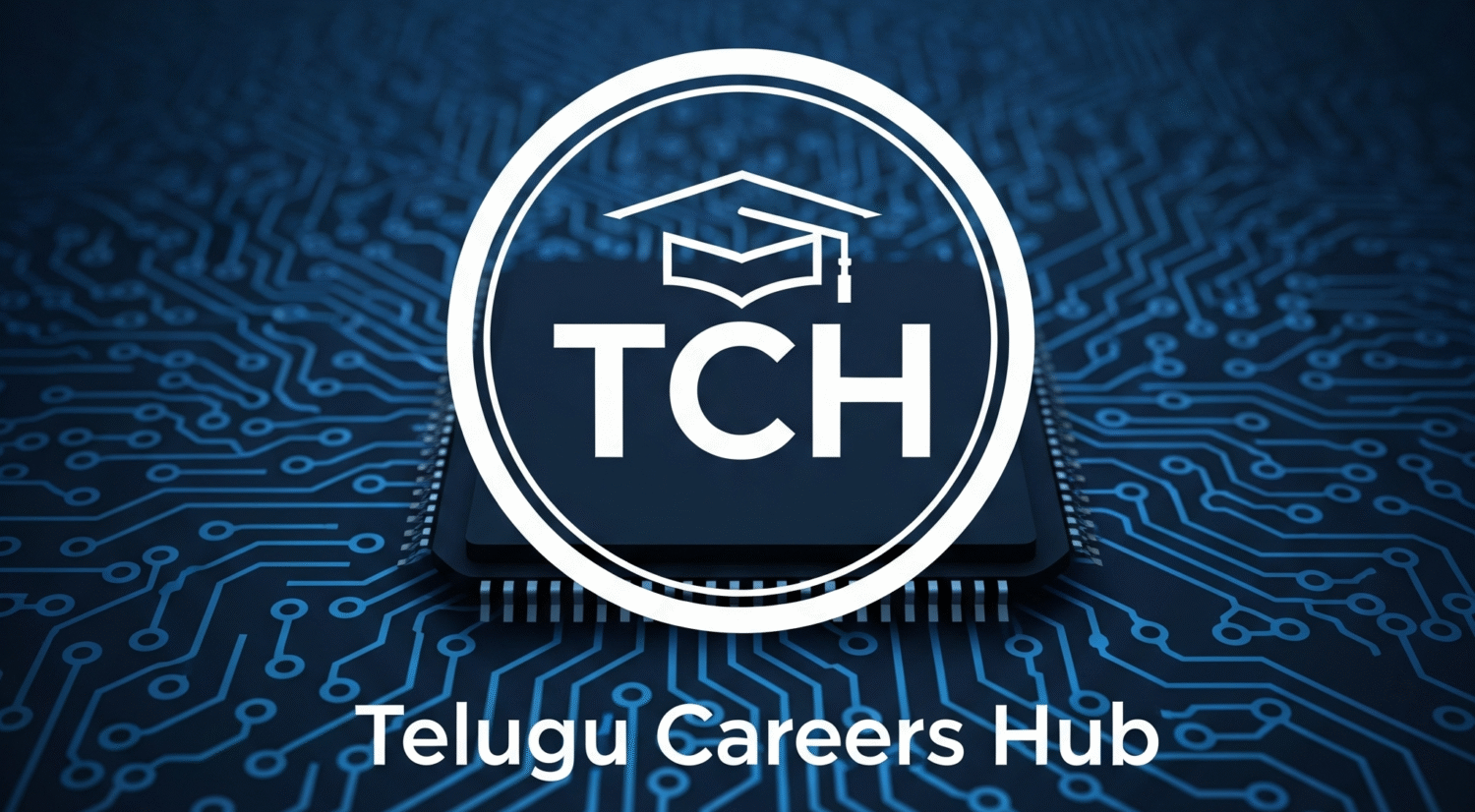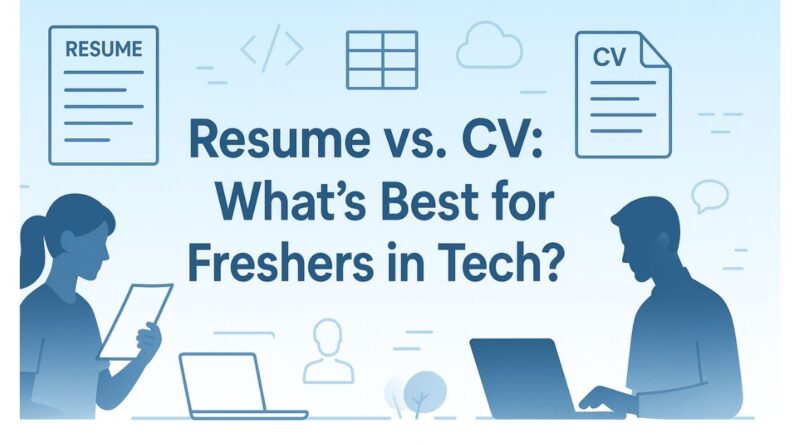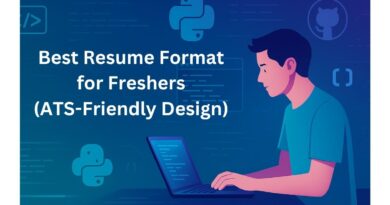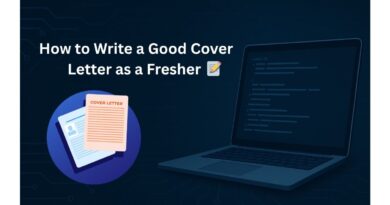💼 Resume vs. CV: What’s Best for Freshers in Tech?
💼 Resume vs. CV: What’s Best for Freshers in Tech?
Entering the world of tech as a fresher can be both exciting and overwhelming. Among the many decisions you’ll face, one of the earliest and most confusing is: Should I create a resume or a CV?
The terms are often used interchangeably in India and other countries, but they’re not the same — especially in the tech industry. If you’re preparing for campus placements, off-campus drives, or applying for internships, knowing the difference between resume and CV is essential.
In this comprehensive guide, we’ll explore the resume vs CV for freshers dilemma, explain their usage in the tech industry, highlight the best format for freshers in tech, and help you craft the perfect document that increases your chances of landing that first big opportunity.
📘 What is a Resume?
A resume is a concise, job-specific summary of your qualifications, technical skills, and relevant achievements. Typically, it is limited to one page and is tailored for each role you apply for.
Key Characteristics of a Resume
-
Length: 1 page for freshers
-
Purpose: Quick, targeted snapshot of your fit for the role
-
Content: Skills, education, projects, certifications, and internships
-
Format: Focused on impact, uses action words, concise bullet points
Why it works: A resume gives hiring managers what they need in less than 10 seconds — your strengths and suitability for a particular role.
Best used for:
-
IT job applications
-
Campus placements
-
Product-based and service-based companies
-
Tech internships
📗 What is a CV?
A Curriculum Vitae (CV) is a comprehensive, detailed document that includes your academic background, research work, certifications, publications, and achievements. There is no page limit for a CV, making it more suitable for academic and research-oriented positions.
Key Characteristics of a CV
-
Length: 2 or more pages
-
Purpose: Complete history of academic and professional achievements
-
Content: Detailed information including seminars, papers, GPA, thesis work
-
Format: Chronological and descriptive
Best used for:
-
MS/PhD applications
-
Research-based tech internships
-
Teaching assistant roles
-
Applications to international universities
📊 Resume vs CV for Freshers: A Side-by-Side Comparison
| Feature | Resume | CV |
|---|---|---|
| Length | 1 Page (for freshers) | 2–3+ Pages |
| Purpose | Focused job application | Academic/research background |
| Customization | Tailored for each job | Static across applications |
| Content Focus | Skills, projects, achievements | Academic record, research, publications |
| Common Use | Jobs in tech, startups, MNCs | Academia, fellowships, higher studies |
This table sums up the difference between resume and CV clearly. Now, let’s go deeper into when and where to use them.
🧠 Why Tech Recruiters Prefer Resumes
When it comes to resume vs CV for IT jobs, the answer is straightforward: resumes win.
Most companies use Applicant Tracking Systems (ATS) to scan through thousands of applications. These systems are designed to analyze short, keyword-rich documents — and that’s exactly what a resume provides.
Why a resume is ideal:
-
Recruiters spend just 6–8 seconds scanning resumes
-
It’s easier to match job keywords and skills
-
Projects and internships are highlighted clearly
-
Shows that you understand professional job formats
For instance, if you’re applying for a software development role, your resume can highlight relevant skills like C++, JavaScript, Git, and projects you built using those technologies — all on one page.
🎯 When Should a Fresher Use a CV in Tech?
Although resumes are the default for job applications, CVs still have their place — especially in academic or research environments.
Use a CV if:
-
You’re applying for research internships or assistantships
-
You’re aiming for a PhD or Master’s degree abroad
-
You’ve worked on publications, academic projects, or open-source research
-
The opportunity specifically requests a CV
For example, if you’re applying to a research internship at IISc or a scholarship program at Google Research India, a CV would help you highlight your academic achievements in depth.
📂 Which Is Better for Campus Placements?
In most campus placement scenarios, companies request a resume, not a CV. Why?
Because they want to:
-
Scan through hundreds of profiles quickly
-
Evaluate tech stack, communication skills, and problem-solving abilities
-
Focus on projects, internships, and core skills, not your school essay competitions
If you’re participating in a pooled campus drive or applying to an MNC like Infosys, TCS, or Capgemini, choose a 1-page resume that communicates your readiness for the role at a glance.
🛠️ Best Format for Freshers in Tech (Resume Template Guide)
Still wondering about the best format for freshers in tech? Here’s a simple structure that works universally:
1. Contact Information
-
Name
-
Phone number
-
Professional email ID
-
LinkedIn/GitHub/Portfolio link
2. Career Objective or Summary
-
A 2–3 line summary of your goals and what you bring to the table
-
Customize it based on the company and role
3. Technical Skills
-
Categorize by Programming Languages, Tools, Frameworks, Databases, etc.
4. Projects
-
Mention 2–3 major academic/personal projects
-
Include live links if available (GitHub, hosted apps)
5. Education
-
List degrees with institution, CGPA/percentage, and year
6. Internships/Trainings
-
Briefly describe responsibilities and technologies used
7. Certifications
-
Relevant online courses (Coursera, Udemy, etc.)
8. Extracurricular/Leadership
-
Hackathons, workshops, club positions, volunteering
🔍 Resume vs CV in Tech Industry: Recruiter Perspective
Understanding the CV vs resume in tech industry means knowing how recruiters operate.
What hiring managers value:
-
Clarity and brevity
-
Direct relevance to job description
-
Easy-to-read format with bullet points
-
Real impact shown through numbers or achievements
What frustrates recruiters:
-
Overloaded CVs with pages of irrelevant content
-
Fancy graphics that confuse ATS systems
-
Lack of focus or keyword alignment
That’s why resumes are so effective — they deliver high signal, low noise.
📌 Common Resume and CV Mistakes to Avoid
Whether you use a resume or a CV, certain errors can cost you interviews.
Top mistakes:
-
Grammatical/spelling errors
-
Copy-pasting from templates without editing
-
Too much personal information (DOB, marital status, etc.)
-
Listing irrelevant or outdated skills (MS Paint, anyone?)
-
Using “CV” for job applications that clearly need resumes
Avoid these mistakes to stay professional and job-ready.
🌍 Global Use: Resume vs CV by Country
The resume vs CV preference also depends on the location of the job:
United States & Canada:
-
Resume for all job applications
-
CV used only for academic/research roles
United Kingdom & Europe:
-
CV is common term, but the format is resume-like (1–2 pages max)
India:
-
Terms are used interchangeably
-
Resume preferred for jobs, CV for higher studies or academics
Understanding regional norms helps avoid miscommunication in international applications.
🧰 Bonus: Tools to Create a Resume/CV
Here are some tools to help you build clean, modern, and ATS-friendly documents:
-
Canva: Free resume builder with modern templates
-
Zety: Guided resume creation with examples
-
Overleaf (LaTeX): Ideal for creating research-based CVs
-
Novoresume: Clean, professional templates for both resumes and CVs
-
Resume Worded: AI feedback on your resume’s ATS score
✅ Final Verdict: Resume Wins for Most Freshers
Let’s wrap it up.
If you’re applying for tech jobs, campus placements, or internships, go with a 1-page resume that’s clear, tailored, and focused on your relevant achievements.
Use a CV only when:
-
You’re applying for academic or research-based opportunities
-
You need to present extensive academic work or publications
Still confused? Just remember this:
For IT jobs, tech roles, and startups — resume.
For research, academia, and MS applications — CV.
Mastering this distinction early will help you avoid rejections and increase your chances of standing out.
Follow us for more Updates: Telugu Careers Hub




